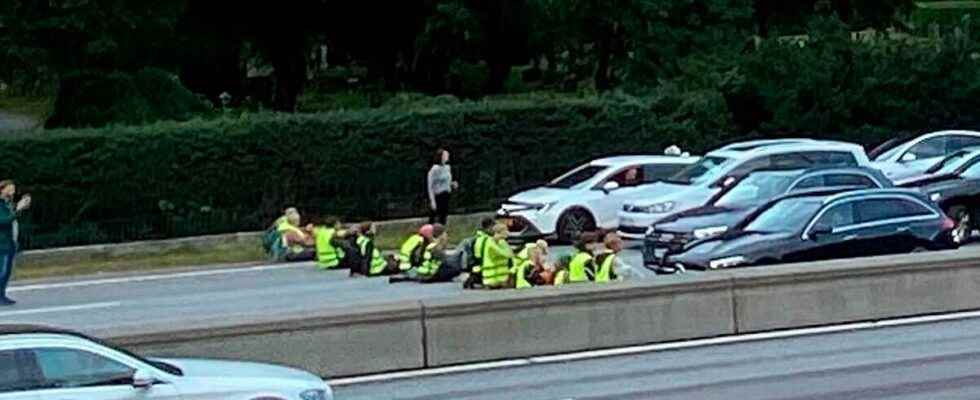Published: Less than 10 min ago
The climate organization Restore Wetlands is behind the blockades in Stockholm traffic.
On Monday, attention was drawn to an action after an ambulance with blue lights was greatly delayed.
– Stopping vehicles of expression is the last thing we want and we always move for them, says the organization’s spokesperson Helen Wahlgren.
On several occasions since March, traffic in Stockholm has been blocked by protesters sitting on the roads, sometimes glued to the ground.
The group behind the blockades is Restore Wetlands. A group that describes themselves as “a peaceful civil disobedience movement made up of ordinary people of various backgrounds and ages.”
On Monday morning, twelve people from the organization went out on the road just south of the Haga Norra traffic stop on the E4 in Stockholm.
Traffic was stopped and long queues quickly formed. Among other things, four ambulances got stuck, according to the police’s initial information.
Including an ambulance with its blue lights on during an emergency, according to the police.
– An ambulance, which had a priority one case, was greatly delayed, said Daniel Wikdahl, press spokesperson for the Stockholm police, on Monday.
Ten people arrested – do not want to stop blue light vehicles
Twelve demonstrators were initially arrested on suspicion of sabotage, blue light sabotage and breach of the public order law.
On Tuesday, ten people were still arrested, currently suspected of sabotage and disobedience to law enforcement.
But Helen Wahlgren, spokesperson for the organization, says that the organization always ensures that blue-light vehicles should not be affected by the actions.
– The ambulance that was on call was delayed, but it was released. Restore Wetlands calls the police every time the campaign starts, says Helen Wahlgren.
– Stopping vehicles of expression is the last thing we want and we always move for them. These are always peaceful actions, we don’t go into confrontation with motorists or the police, she continues.
Police investigation is ongoing
At the moment, it is unclear how the ambulances, and any patients, were affected by the delay. Aftonbladet has been in contact with the Stockholm police and prosecutor Marina Ivic, who is leading the investigation.
So far, she does not want to comment further on the criminal suspicions, but says that the incident is under investigation.
– We investigate all effects and parameters, says Marina Ivic.
Aftonbladet has also been in contact with several of the lawyers who defend the suspected activists.
– For my client, it was crucial that blue light personnel should not be hindered. There was also a plan for how it would be ensured that it would not happen. It was decisive for her decision whether to participate, says lawyer Linus Gardell, who defends one of the suspects.
“Will continue until politicians react”
On Tuesday, the group again went out and demonstrated. This time a number of people blocked E4/E20 at Västberga in Stockholm in the northbound direction.
The police removed the demonstrators from the road and then arrested all of them, suspected of sabotage.
– There is a reason why people choose to sit in such a place. Quite ordinary people choose to sit on a motorway to draw attention to the fact that we are in an emergency situation, says Helen Wahlgren.
She also says that the group’s goal with the actions is to get politicians to react and invite the organization to talk. Until that happens, if it happens, the group will continue to demonstrate and block the roads.
– Restore wetlands has been on the roads in three rounds to draw attention to the climate crisis. On numerous occasions, almost every time, people have been caught. But we make the simplest demand on the government: restore our wetlands. It is one of the most effective ways to reduce carbon dioxide levels. But no politician has contacted us, continues Helen Wahlgren.
